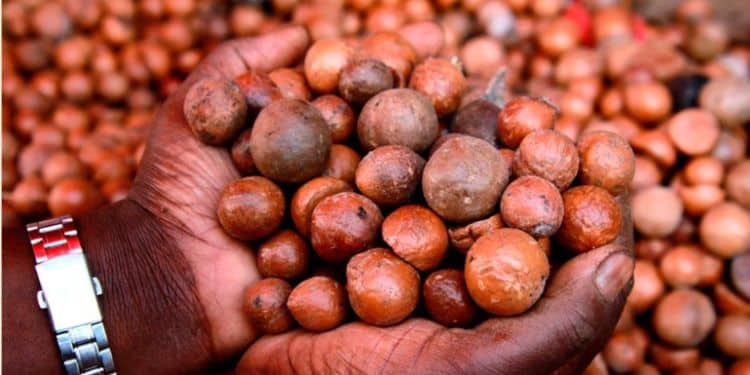The Ministry of Agriculture has issued a fresh directive to farmers and exporters of Macadamia nuts across the country.
In a statement on Wednesday, December 4, Agriculture Cabinet Secretary Andrew Karanja lifted a ban on the export of raw (in-shell) macadamia nuts.
Therefore, effective December 4, 2024, the decision will allow licensed exporters to trade raw macadamia nuts for 30 days.
According to the CS, the move is expected to address logistical challenges posed by stockpile accumulation and facilitate smoother operations within the macadamia value chain.
“I hereby authorize the export of raw (in-shell) macadamia nuts for a period of 30 days from the date of this notice,” read the notice in part.

Also Read: 8 Macadamia Cartels Allegedly Exploiting Farmers Deported
Reason for the Lift of the Export Ban
On November 3, 2023, the government imposed a 12-month ban on raw macadamia nut exports, which lapsed on November 2, 2024.
Following the ban’s expiration, the Agriculture and Food Authority, through its Nuts and Oil Crops Directorate, conducted a physical verification exercise to establish stock levels held by exporters, processors, and marketing agents.
Consequently, the exercise revealed that some exporters still had in store significant quantities of unexported raw macadamia nuts.
“This intervention will enable verified stocks held by various exporters to be cleared for export,” added the CS.
Also Read: Scam Alert: Kakuzi Warns Kenyans Over Fake Employees Taking Orders
Ban of Macadamia Export
Agriculture Cabinet Secretary Andrew Karanja said that the November 2, ban was reached after consultations with industry stakeholders.
The Agriculture and Food Authority (AFA) was then directed to strictly enforce compliance with the directive, including revoking the licenses of those who violate it.
Karanja said that Kenya’s macadamia industry was predominantly export-driven, with approximately 95% of its annual production destined for international markets.
“In 2019, farm gate prices for macadamia nuts in shell (NIS) reached a record high of Ksh180 per kilogram. However, by early 2023, prices had significantly declined to between Ksh30 and Ksh40 per kilogram,” he explained.
Follow our WhatsApp Channel and join our WhatsApp Group for real-time news updates.




![Debate Rages Over Proposed Increase In Legal Drinking Age [Video] Nacada Raises Legal Drinking Age From 18 To 21]( https://thekenyatimescdn-ese7d3e7ghdnbfa9.z01.azurefd.net/prodimages/uploads/2025/07/beer-360x180.jpg)



































































![Debate Rages Over Proposed Increase In Legal Drinking Age [Video] Nacada Raises Legal Drinking Age From 18 To 21]( https://thekenyatimescdn-ese7d3e7ghdnbfa9.z01.azurefd.net/prodimages/uploads/2025/07/beer-120x86.jpg)